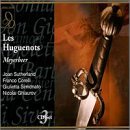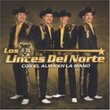| All Artists: Giacomo Meyerbeer, Gianandrea Gavazzeni, La Scala Theater Orchestra & Chorus, Joan Sutherland, Nicolai Ghiaurov, Franco Corelli, Fiorenza Cossotto, Vladimiro Ganzarolli, Alfredo Giacomotti, Walter Gullino, Silvio Maionica, Silvio Majonica, Piero de Palma, Giulietta Simionato, Manuel Spatafora, Giorgio Tozzi, Antonio Cassinelli Title: Meyerbeer: Les Huguenots (Gli Ugonotti) Members Wishing: 0 Total Copies: 0 Label: Opera D'oro Release Date: 5/23/2000 Album Type: Box set Genre: Classical Style: Opera & Classical Vocal Number of Discs: 3 SwapaCD Credits: 3 UPC: 723723669827 |
Search - Giacomo Meyerbeer, Gianandrea Gavazzeni, La Scala Theater Orchestra & Chorus :: Meyerbeer: Les Huguenots (Gli Ugonotti)
 | Giacomo Meyerbeer, Gianandrea Gavazzeni, La Scala Theater Orchestra & Chorus Meyerbeer: Les Huguenots (Gli Ugonotti) Genre: Classical
|
Larger Image |
CD DetailsSimilar CDs |
CD ReviewsJoan Sutherland, the vocal paganini 02/18/2001 (5 out of 5 stars) "Joan Sutherland, La Stupenda, the vocal Paganini is very great here, singing some of the most taxing coloratura with great ease and brilliance, tossing extremely high notes here and there, and trilling her way through the first act, she was the finest coloratura of the last century, at least. Corelli's ringing spinto sounds is immense! When he and Simionato hit that top D flat in the grand duet I couldn't believe it. Corelli is the most exciting of all the tenors I've heard, and he has all the high notes, and they're big and full of vibrato. This one is from the golden age." Why Live Recording is So Important! La Cieca | New York New York New York | 09/04/2000 (5 out of 5 stars) "A souvenir of one of the great operatic nights of the 20th century and of the post-war Golden Age at La Scala: performers at their peak in a great and difficult work. Sutherland is at her most brilliant and beguiling as Marguerite, the coloratura still diamond-brilliant and not murky as it later became. Simionato brings great passion and a huge rich sound to Valentine, with suprisingly powerful, exact high notes. Corelli is quite simply a god, one of nights when everything was working for him, power, glamour, the whole thing. The highlight is quite rightly the superb Act IV love duet. You can hear the audience hold their breath until the finish, then the place erupts. Only on a live recording will you ever hear this kind of red-blooded opera." Bravi, and double Brava for Joan Sutherland La Cieca | 05/24/2003 (5 out of 5 stars) "The cast is legendary. Corelli sang all the high notes easily and holds them. Simionato, although a mezzo actually matched many of Corelli's high C's.
But the real star is the coloratura, Dame Joan Sutherland, singing one of the most difficult role in the entire reportoire with such ease as if just opening her mouth. This rediculously impossible to sing written music is sheer child's play for her. Throwing trills, runs, scales, staccato and extremely high notes here, there, and everywhere. All the while maintaining what many consider the most pure and glorious soprano sound of our time. She is the greatest coloratura soprano in the entire operatic heaven. Listen to her and the others in this most difficult opera and be dumbfounding by phenomenal singing. (unfortunately, Sutherland, especially in the 1980's, when she was way past 50, continue to sing and record operas. Thereby discrediting herself to some extent if a new opera lover had not heard her in her prime period of between 1956-1976 and therefore thought that a 1980 recording of Sonnambula is the true Sutherland sound when that was the period that Sutherland lost at least half her voice and technique. Nevertheless, the great Prima Donna had a massive 30 year spand of spectacular singing career of performing the most fiendishly difficult music ever written for the soprano voice). P.S. Corelli and Simionato performed the most sensational grand duet on record and ranks as one of the most impressive display of that type of demanding verisimo singing." |

 Track Listings (17) - Disc #1
Track Listings (17) - Disc #1
